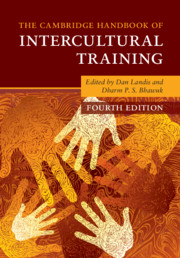Book contents
- The Cambridge Handbook of Intercultural Training
- Reviews
- The Cambridge Handbook of Intercultural Training
- Copyright page
- Dedication
- Frontispiece
- Contents
- Figures
- Tables
- Editors and Contributors
- Foreword
- Preface
- 1 Introduction and Theoretical Framework
- Part I Theoretical Foundations of Intercultural Training
- Part II Practice of Intercultural Training
- Part III Indigenous Psychology and Intercultural Training
- Part IV New Interdisciplinary Approaches to Intercultural Training
- 20 Cultural Neuroscience Basis of Intercultural Training and Education
- 21 Perceptual Representation
- 22 Emotional Contagion, Intimate Intercultural Relationships, and Intercultural Training
- 23 Dialogue and Culture
- 24 Optimizing Globalization through “Intelligent Swarming”
- Part V Summing Up
- Index
- References
23 - Dialogue and Culture
Reflections on the Parameters of Cultural Dialogue
from Part IV - New Interdisciplinary Approaches to Intercultural Training
Published online by Cambridge University Press: 18 September 2020
- The Cambridge Handbook of Intercultural Training
- Reviews
- The Cambridge Handbook of Intercultural Training
- Copyright page
- Dedication
- Frontispiece
- Contents
- Figures
- Tables
- Editors and Contributors
- Foreword
- Preface
- 1 Introduction and Theoretical Framework
- Part I Theoretical Foundations of Intercultural Training
- Part II Practice of Intercultural Training
- Part III Indigenous Psychology and Intercultural Training
- Part IV New Interdisciplinary Approaches to Intercultural Training
- 20 Cultural Neuroscience Basis of Intercultural Training and Education
- 21 Perceptual Representation
- 22 Emotional Contagion, Intimate Intercultural Relationships, and Intercultural Training
- 23 Dialogue and Culture
- 24 Optimizing Globalization through “Intelligent Swarming”
- Part V Summing Up
- Index
- References
Summary
This chapter explores the ways cultures define their parameters while engaging in dialogue with their cultural others. In my reading, cultures are open systems that are constantly in dialogue, whether the dialogue has a particular structure or not. Rather than functioning within the determined parameters, dialogues negotiate and re-constitute the existing boundaries, and in this sense, dialogues are not means to an end but are capable of determining their own course. Violence, accordingly, is a form of dialogue, although simultaneously a rupture in the life of autonomous self-constituting dialogue. By reading classical Hindu world that devised mechanisms for cultural synthesis and symbiosis on one hand and systematic models for dialogue on the other that took away societal tension from the public to the limited philosophers and theologians, I explore in this chapter the creative domains of cultural dialogue in constituting non-violent society. Dialogical reading of cultures reveals its complexity, as every single culture is a never-ending synthesis. This very awareness of the factors of synthesis, I argue, opens the possibility of resolving cultural tension that often stems from the failure of recognizing the parameters that sustain difference. Dialogues, therefore, are not meant to dissolve difference. On the contrary, the function of healthy dialogue is to sustain difference while also sustaining the dialogue itself.
Keywords
- Type
- Chapter
- Information
- The Cambridge Handbook of Intercultural Training , pp. 658 - 679Publisher: Cambridge University PressPrint publication year: 2020
References
- 1
- Cited by

